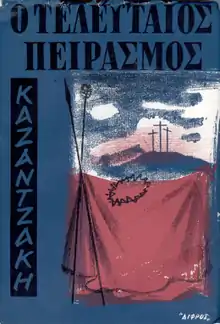The Last Temptation of Christ (novel)
The Last Temptation of Christ or The Last Temptation (Greek: Ο Τελευταίος Πειρασμός, O Teleftéos Pirasmós) is a historical novel written by Nikos Kazantzakis, first published in its original Greek in 1955 before being translated into English in 1960. The novel depicts the life of Jesus and his struggles with various forms of temptation, including fear, doubt, depression, reluctance, and lust.
 First Greek edition (1955) | |
| Author | Nikos Kazantzakis |
|---|---|
| Original title | O Teleutaios Peirasmos |
| Translator | Peter A. Bien (US) |
| Country | Greece |
| Language | Greek |
| Genre | Fiction novel |
| Publisher | Simon & Schuster (USA) & Bruno Cassirer (UK) |
Publication date | 1955 |
| Media type | Print (Hardback & paperback) |
| Pages | 506 (first edition, hardback) |
| ISBN | 0-684-85256-X |
| OCLC | 38925790 |
Upon its publication, the book was condemned by the Catholic Church and the Greek Orthodox Church; it has since been challenged by numerous Christian groups and right-wing organizations. A 1988 film adaptation directed by Martin Scorsese was similarly controversial.
Themes
Kazantzakis argues in the novel's preface that by facing and conquering all of man's weaknesses, Jesus struggled to do God's will without ever giving in to the temptations of the flesh. The novel advances the argument that, had Jesus succumbed to any such temptation, especially the opportunity to save himself from the cross, his life would have held no more significance than that of any other philosopher.
The critic I. A. Richards has stated that Kazantzakis' novel tries to reclaim the values of early Christianity, such as love, brotherhood, humility, and self-renunciation.[1] According to the book's English translator, Peter A. Bien, the psychology in The Last Temptation is based on the idea that every person, Jesus included, is evil by nature as well as good, violent and hateful as well as loving. A psychologically sound individual does not ignore or bury the evil within him. Instead, he channels it into the service of good.[2]
Controversy
On January 12, 1954, the Catholic Church added the novel to the Index Librorum Prohibitorum, a list of works deemed heretical, in a brief decree stating only that "things of faith and morals are to be safeguarded".[3] In February 1955, the Holy Synod of the Greek Orthodox Church in Athens attempted to have all of Kazantzakis' books banned in Greece, arguing that The Last Temptation of Christ "contains evil slanders against the Godlike person of Jesus Christ....derived from the inspiration of the theories of Freud and historical materialism, [this book] perverts and hurts the Gospel discernment and the God-man figure of our Lord Jesus Christ in a way coarse, vulgar, and blasphemous."[3]
In 1963, a Roman Catholic priest in Ashland, Wisconsin forbade one of his parishioners from returning a library copy of The Last Temptation of Christ, arguing "that it would be a mortal sin to make it available to others."[4] In 1964, a right-wing extremist group called the Citizens Group for Clean Books demanded that the novel be removed from public libraries in Arcadia, California on the basis that it was "blasphemous, obscene and defamatory"; as a result, the book was made "available on a limited basis to persons over the age of 18."[5]
Film version
The director Sidney Lumet acquired the film rights to Kazantzakis' novel, describing it as the story "of how a man pushes himself to extremes he never knew he was capable of," with Judas emerging "as a strong man, a sort of hero". Lumet commissioned a screenplay written by Lazarre Seymour Simckes and announced his plans to shoot the film in the fall of 1971, though the project did not come to fruition.[6] After many delays, a film version directed by Martin Scorsese was released in 1988, starring Willem Dafoe as Jesus and Harvey Keitel as Judas Iscariot.
In popular culture
The American singer-songwriter Judee Sill referred to Kazantzakis as her favorite writer; her 1971 song "Jesus Was a Cross Maker" was inspired by the depiction of Jesus in The Last Temptation of Christ.[7]
References
- Lewis A. Richards, "Christianity in the Novels of Kazantzakis," Western Humanities Review 21, p. 52
- Peter Bien, "Tempted by Happiness: Kazantzakis' Post-Christian Christ", Pendle Hill Publications, Wallingford, PA p. 12
- Middleton, Darren J. N., and Peter Bien, eds. God's Struggler: Religion in the Writings of Nikos Kazantzakis. Macon: Mercer University Press, 1996. 26-27.
- "Library Bars Novel Assailed By Priest," The New York Times 13 Apr. 1963.
- "Rightists Attack Coast Libraries," The New York Times 22 Nov. 1964.
- Weiler, A. H. "Movies," The New York Times 21 Feb. 1971.
- Lewis, Grover. “Judee Sill: Soldier of the Heart,” Rolling Stone 13 Apr. 1972.